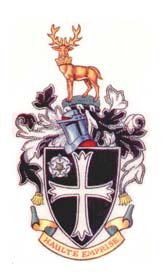Monthly Talks
Meetings are usually on the first Wednesday of the month from October to April, but this may change if too near to New Year’s Day Christmas or the Easter weekend. They are held in Cottingham Civic Hall, Market Green 7.45–9.15 p.m. Admission fee for members is £2 and for non-members £4.
Programme of Talks 2025–26
October 1st: Paul Schofield, “The Avenues and Pearson Park”.
A journey though Hull’s oldest public park and the fascinating Avenues area, looking at the history, architecture and personalities of this unique part of the city.
November 5th: Mark Richmond, “A ‘German’ in Cottingham during the First World War.” The Annual Stamp Lecture.
Owner of Elm Tree House (now the Cottingham Memorial Club), Gunther Lutze was a naturalised immigrant from Germany who had made good in Britain as a coal exporter. The coming of the First World War, however, put his success in jeopardy due to Government regulations, widespread Germanophobia and the prejudices of local commercial institutions. Not passive by nature, he sought to defend himself, firstly by changing his German-sounding name to Lacey and then by responding to threats against his business interests, including through outspoken public statements that caught the attention of the national press. In the process, he disassociated himself from some leading figures in Hull’s German community.
December 3rd: Peter Connelly, “The Seeds of Change Project: celebrating the history of Hull’s oil seed crushing industry”.
Oil seed crushing was one of the major industries that Hull’s success was built upon. It was a key product for making lamp oil, soap, paints, varnishes and ink, not to mention cattle cake and fertiliser. The crushing mills date back to at least the 16th century on the banks of the River Hull, where it grew to considerable proportions in Wincolmlee and Wilmington. Cottingham owed some of its wealth in the 18th to the early 20th centuries to the Hull merchants who ran the mills and the associated factories and who built or bought themselves a fine house and grounds here. In December 2022, however, the industry all but came to an end. Peter Connelly, archaeology manager of Humber Field Archaeology, will illustrate its history and explain the Seeds of Change Project. This has been designed to promote a greater public understanding and appreciation of this often-overlooked industry and is funded by a grant from Historic England’s ‘Everyday Heritage’ scheme.
January 7th: Colin Bradshaw, “Medieval Beverley”.
One of England’s best medieval towns, Beverley has a long history, with royal connections and many existing buildings dating from the Middle Ages, including its churches, the guildhall, the friary and many more humble buildings. This talk approaches the topic by looking at the characteristics of a town of that period, when it prospered both as a religious and a trading centre, with its numerous guilds. Colin will discuss the town’s medieval defences and the threats that faced the townspeople, and he promises to reveal aspects of Beverley’s history that he thinks will surprise us.
February 4th: Michele Lewis, “The pavement that walked (and a few that didn’t)”.
The talk examines the discovery of Roman remains in a Brantingham quarry during the 2nd World War and the subsequent excavation. What followed is Yorkshire’s biggest archaeological mystery! Michele will take us back to 4th-century Yorkshire and the rich legacy of Roman villa building in this area, as evidenced in the mosaics uncovered by archaeologists – and the occasional farm labourer.
March 4th: Mike Rymer. “The Berry mug and the Hull whaling trade in the 18th century”.
In 2020 a ceramic tankard, painted under the glaze with a sailing ship, was discovered when Castle Street was being excavated prior to improvements to the A63. It had been the site of an additional graveyard for Holy Trinity Church. The suspicion is that it belonged to Peter Pierce Dobbyn, former master of the ‘Berry’, one of the first of Hull’s 18th-century whaling ships. Mike takes the tankard and the sailing ship ‘Berry’ as the starting point of a fascinating history of Hull’s involvement in arctic whaling during that century.
April 1st AGM and social event for Society members

